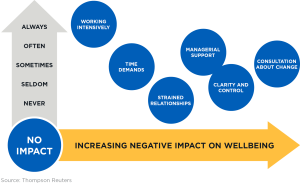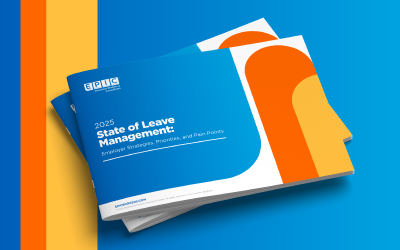Significant progress has been made in recognizing the importance of mental health and wellbeing, however, there is still a lot more that can – and should – be done. Proactively providing employees with appropriate well-being support and resources can help professional service firms mitigate a variety of risks and facilitate other benefits.
While professional wellbeing is crucial to a firm’s sustainability, investing in it is often an overlooked risk management opportunity.
DOWNLOADABLE RESOURCES
Lemme’s Zina Saeed spoke with Roberta Benson, founder of The Benson Firm, to discuss why this issue continues to pose such significant challenges for firms of all sizes despite it being recognized as one that’s more important than ever.
Saeed: Roberta, it seems we’ve known for a while those professionals have been languishing with respect to wellbeing. Why has so little been done to address it?
Benson: Perhaps it’s because stressors (i.e., high demands) are to some extent integral to the practice of law, at least at this level; and recognizing and addressing stress may raise concerns (for the person experiencing it) that they will be perceived as not “cut out” for the job.
I also believe that soldiering on in the face of demands and stress has become something of a badge of honor or rite of passage. It goes hand in hand with our American culture that if working hard is good, working harder is better. . .or “workarexia” as I call it.
Finally, and at the risk of generalizing, there is our deeply ingrained competitive and high-achieving nature as lawyers.
These are in my opinion some deeply rooted cultural reasons why too little has been done to address professional wellbeing, but that’s not to say there aren’t ways to reduce – or at least address – stress in the workplace.
Saeed: So, if we accept that wellbeing contributes to organizational success what is the most important thing firms should be doing now to address this issue?
Benson: The most important thing is to make room for wellbeing within your culture, with firm leadership demonstrating a personal commitment to mental health and well-being.
This tone-from-the-top approach may require a significant shift in firm culture to accommodate the fact that most people are healthier – mentally and physically – when they have appropriate time for activities/interests/relationships outside of work. The elusive “work/life balance” can only be achieved with a supportive employer who embraces such balance. The challenge is that such balance requires time away from work, and time for professional service firms is seen, at least at a superficial level, as the lifeblood (i.e., revenue stream) of the organization. At a deeper level, however, the success of the organization depends on the quality of the time spent by its professionals. Thus, the justification for wellbeing can be made by recognizing that any impact to the bottom line in reduced “hours” is more than made up for in the longevity and commitment of professionals, the corresponding quality of the work product, and the strength of client relationships.
It’s crucial that firm leadership works to make the culture of wellbeing visible. Personal time (for family, holidays, exercise, whatever) should be a visible, accepted, and integral part of company culture. Professionals and staff should be encouraged to take time off; senior people should set the example by taking their own time off, and truly taking it off (rather than returning to the office boasting about how it was really a “working vacation” the entire time). Before I started my firm, I had been practicing law for nearly a quarter-century and it occurred to me that I never heard anyone ask, “when are you taking a vacation this year?”
Finally, the availability of HR resources and benefits such as employee assistance resources should be prominently displayed (e.g., in common areas) without stigma.
Saeed: We would be remiss to not discuss the extent to which technology has had an impact on stress levels, particularly during the pandemic while professionals have been working remotely almost exclusively.
Benson: We start with the fact that being glued to a phone or laptop is not conducive to physical wellbeing. Added to this is the accelerated flow of communication: more exchanges, with more people over a greater portion of the day, mean that professionals juggle multiple tasks and quickly shift focus from one thing to another. The pressure to respond immediately and always be available can be an error waiting to happen, such as the inadvertent “reply to all” or inclusion of information or recipients not intended.
I love the line in your signature block, Zina, stating that your working hours may not be the same as mine and I should not feel pressure to respond to you immediately. This would be an amazing concept for a firm to embrace – and should be made easier by the fact that sophisticated clients do not necessarily want to think that their professional is working in the middle of the night! And while professional services firms are generally the ones feeling the need to respond right away, incorporating that concept into the communications the firm sends out could set a very positive tone, both for clients as well as for the firm itself. “We value our professionals’ lives and time away from work for enrichment and health” could be a really impactful part of a firm’s persona/marketing.
Saeed: So how many Errors and Omissions claims could be tied to this issue of wellbeing or lack thereof?
Benson: It does seem fair to assume that any claim arising out of oversight or inattention could be tied to an underlying stress issue such as overwork, mental health crisis, etc.; data published by one insurer to many AmLaw 200 firms indicates that, pre-pandemic, at least 3% of claims are tied to impairment issues such as alcoholism, substance abuse or mental health concerns.
While law firms, law schools, bar associations, courts, and malpractice insurers have historically taken a largely hands-off approach to mental health and wellbeing issues, successful firms may no longer have that luxury, as the next generation(s) of professionals may choose to vote with their feet if they don’t feel their firm is taking this issue seriously.
With the current spotlight on work-life balance, firms have a great opportunity to reset this now, helping them to retain great talent and clients alike.
CONTRIBUTORS
Zina Saeed is a professional liability professional with an insurance career spanning 20 years. She has a legal background with extensive experience in domestic and UK claims handling, underwriting, and brokering placements for Top 100 accounting firms.
Roberta Benson is a partner and owner of the Benson Firm in Austin, Texas. With experience in a broad range of insurance coverage types, and an active trial practice in both coverage litigation and in select insurance defense matters, The Benson Firm focuses on the representation of insurers as coverage and monitoring counsel.
Lemme, a Division of EPIC
Lemme, a division of EPIC, (“Lemme”) has been providing specialized insurance brokerage and consulting services to the accounting and legal profession since 1998. Our experienced brokers work with clients to understand their business, assess needs, and develop solutions using our integrated approach to service. Lemme approaches each opportunity with integrity, transparency and full accountability to our clients. We are honored to have built long-term relationships with clients ranging in size from top national firms to large regional and local firms throughout the United States. In working with clients across the full spectrum of service offerings, specialty niches, and overall risk profiles, we gain valuable insights into claim trends, regulatory requirements and best practices we share with decision-makers. Moreover, this knowledge gives us the ability to build enhanced policy wordings, program structures and risk management to achieve the best overall results for our clients.
Related Content
Industries
Law Firms
Discover the EPIC Law Firm Group The EPIC Law Firm Group is a specialized insurance brokerage and consulting ...
Products
Risk Management
Our experienced teams take an enterprise-wide approach, consulting closely with you to identify, analyze and ...
Products
Property & Casualty Insurance
As one of the nation’s 15 largest retail brokers, EPIC provides the reach, resources, expertise, advocacy ...



